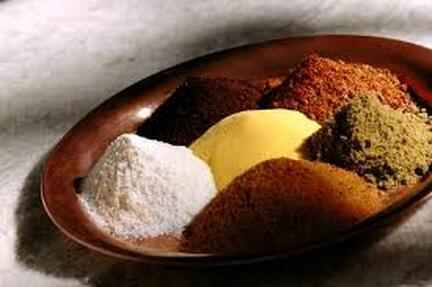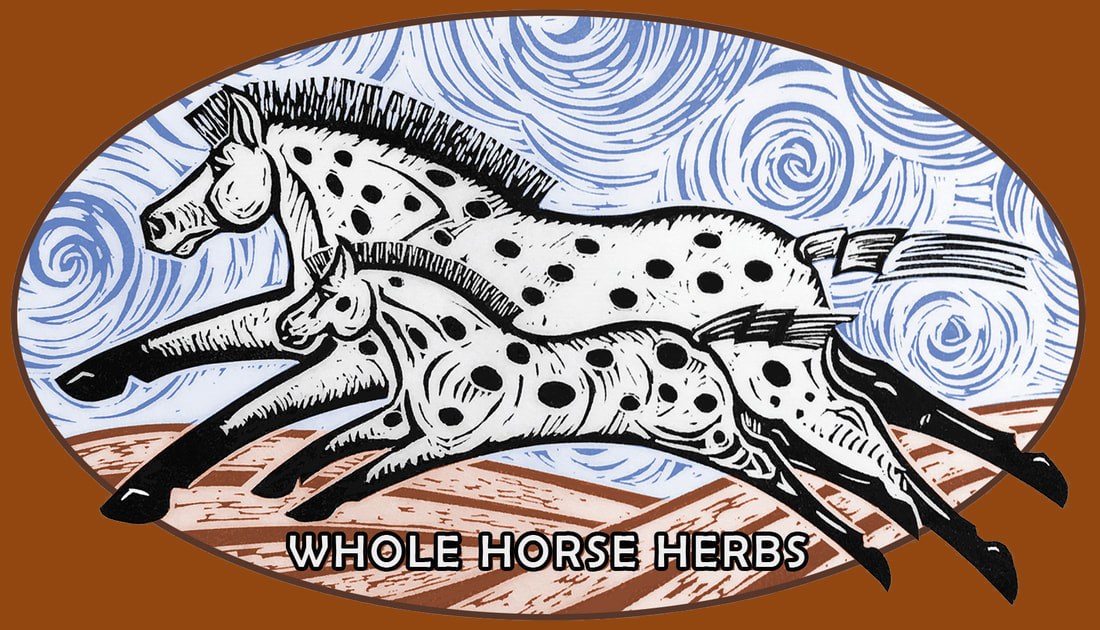The Benefits of Chinese Herbal Therapy

How Herbs Work - Parts 1 and 2
By Gloria Garland L.Ac., Dipl. Ac. & CH.
A series of articles exploring Chinese herbs and their uses in the stable.
As an herbalist I am often asked why I use Chinese herbs and how are Chinese herbs different from other herbs.
I prefer Chinese herbs due to their enormous flexibility and accuracy in addition to their long history of traditional usage and current scientific research. Chinese herbal medicine is an orderly system of prescribing and combining ingredients based on presenting symptoms and the unique qualities of the herbs themselves. The practice of Chinese herbal medicine may be ancient but the science of herbal medicine continues to grow and evolve to meet the needs of modern horses and riders.
The Benefits of Chinese Herbs
There are numerous benefits associated with the incorporation of herbs into your horses’ wellness program. Chinese herbs are safer for long term use making them suitable for chronic conditions and the older horse. Herbs have less negative side effects than drugs and can be used as adjunctive therapies along with standard veterinary medicines. Chinese herbal formulations can be tailored to your horses needs making them highly treatment and ailment focused. They are excellent for trauma & first aid.
Herbs in the Stable
A few Chinese herbs useful for common conditions include the following: Vitex (Man jing zi) is used for Cushing’s disease (metabolic syndrome) and for moody mares. Man jing zi suppresses tumor growth on the pituitary gland and stimulates the production of the calming hormone progesterone. Cinnamon (Rou gui) is effective in the treatment of insulin resistance (IR) and chronic laminitis. Rou gui enhances the glucose transport process while stimulating the micro-circulation in the lamina. Gynostemma (Jiao gu lan) is used for inflammatory conditions and laminitis. Jiao gu lan has anti-inflammatory properties, which counteract the release of endothelin, a hormone that causes vessel constriction and shut down. It stimulates the production of nitric oxide and is being used experimentally for horses with DSLD.
Are Chinese Herbs different from other herbs?
The practice of Chinese herbology differs from other forms of herbal medicine in several ways. The most fundamental is the treatment of the individual as a unique whole rather than treating a symptom or a set of symptoms. Based on a horse’s unique symptom profile, the Chinese herbalist will treat the manifestation (symptoms) as well as the root or constitutional cause of the disease. For example: for an overanxious, nervous horse a non Chinese herbalist might prescribe the single herb, valerian, treating only the symptoms. A Chinese herbalist views the horse’s anxiousness and nervous emotional state as the manifestation of a deeper problem and combines a number of herbs to treat the outward symptoms of nervousness and anxiety, plus herbs directed at the root cause of the problem. Thereby, both the source and the manifestation of the disorder are treated simultaneously. Treating the whole horse and not just the symptom is the hallmark of Chinese herbal therapy and the key to its effectiveness. Part two
This is part two of an ongoing series of articles exploring Chinese herbs and their uses in the stable.
Previously, I discussed how the practice of Chinese herbal therapy differs from other forms of herbal medicine and some of the current uses and benefits of herbs in the stable. I will continue with how Chinese herbs work.
Chinese Herbs - how do they work?
Chinese herbs are classified and used based on several factors. First, an herb is classified by its physiological effect or what it does in the body, for example, herbs that stop bleeding (hemostatic) or promote sweating (diaphoretic). Additionally, Chinese herbs are categorized by the meridian /organ system affected and by their taste and temperature. This system is unique to the practice of Chinese herbalism. Of the 7,000 documented medicinal species, 400 are used regularly, mixed, matched and paired based on a desired effect.
How do herbs work? Taste and flavor
Chinese herbs are segregated based on taste and flavor: sour, bitter, sweet, pungent and salty.
Sour herbs are astringent by nature. Think of lemons and vinegar. They promote digestion and stop abnormal secretions and discharges. Bitter herbs clear heat. Strong black coffee and unsweetened cocoa are bitter flavors. Bitter herbs are anti-inflammatory, anti-viral, anti-bacterial, anti-fungal and fever-reducing. Sweet herbs are nourishing. Honey, dates and chocolate are sweet flavors. Sweet herbs calm spasms, stimulate growth and generate flesh. Pungent flavors include aromatic herbs like garlic and cloves. Pungent herbs promote sweating, open the nose and resolve dampness and phlegm. Salty herbs soften nodules and purge intestines. Soy sauce is a salty flavor.
How do herbs work? Temperature
Chinese herbs are also categorized by their temperatures. They are divided into cold, cool, neutral, warm and hot categories.
Cold herbs reduce fever, inflammation and are useful for fighting infections. Martial artists rely on topical preparations of cold herbs to reduce swelling and inflammation without ice. Cool herbs also reduce fever, lower blood pressure and calm the spirit and emotions. They are useful for calming a nervous, anxious horse. Neutral herbs balance the effects of other herbs and are used to provide equilibrium in a formula. Warm herbs like cinnamon (Rou gui)alleviate chills, warm the meridians and extremities and promote circulation. Hot herbs like capsicum dispel cold and strengthen organs.
How do herbs work? Careful combining
When developing an equine herbal formula, the Chinese herbalist is much like a gourmet chef. The chef combines flavors, textures and ingredients to create a well seasoned, balanced meal. Like the chef, the Chinese herbalist also combines flavors, temperatures and ingredients to develop a well balanced and effective formula designed with a specific health goal.
By Gloria Garland L.Ac., Dipl. Ac. & CH.
A series of articles exploring Chinese herbs and their uses in the stable.
As an herbalist I am often asked why I use Chinese herbs and how are Chinese herbs different from other herbs.
I prefer Chinese herbs due to their enormous flexibility and accuracy in addition to their long history of traditional usage and current scientific research. Chinese herbal medicine is an orderly system of prescribing and combining ingredients based on presenting symptoms and the unique qualities of the herbs themselves. The practice of Chinese herbal medicine may be ancient but the science of herbal medicine continues to grow and evolve to meet the needs of modern horses and riders.
The Benefits of Chinese Herbs
There are numerous benefits associated with the incorporation of herbs into your horses’ wellness program. Chinese herbs are safer for long term use making them suitable for chronic conditions and the older horse. Herbs have less negative side effects than drugs and can be used as adjunctive therapies along with standard veterinary medicines. Chinese herbal formulations can be tailored to your horses needs making them highly treatment and ailment focused. They are excellent for trauma & first aid.
Herbs in the Stable
A few Chinese herbs useful for common conditions include the following: Vitex (Man jing zi) is used for Cushing’s disease (metabolic syndrome) and for moody mares. Man jing zi suppresses tumor growth on the pituitary gland and stimulates the production of the calming hormone progesterone. Cinnamon (Rou gui) is effective in the treatment of insulin resistance (IR) and chronic laminitis. Rou gui enhances the glucose transport process while stimulating the micro-circulation in the lamina. Gynostemma (Jiao gu lan) is used for inflammatory conditions and laminitis. Jiao gu lan has anti-inflammatory properties, which counteract the release of endothelin, a hormone that causes vessel constriction and shut down. It stimulates the production of nitric oxide and is being used experimentally for horses with DSLD.
Are Chinese Herbs different from other herbs?
The practice of Chinese herbology differs from other forms of herbal medicine in several ways. The most fundamental is the treatment of the individual as a unique whole rather than treating a symptom or a set of symptoms. Based on a horse’s unique symptom profile, the Chinese herbalist will treat the manifestation (symptoms) as well as the root or constitutional cause of the disease. For example: for an overanxious, nervous horse a non Chinese herbalist might prescribe the single herb, valerian, treating only the symptoms. A Chinese herbalist views the horse’s anxiousness and nervous emotional state as the manifestation of a deeper problem and combines a number of herbs to treat the outward symptoms of nervousness and anxiety, plus herbs directed at the root cause of the problem. Thereby, both the source and the manifestation of the disorder are treated simultaneously. Treating the whole horse and not just the symptom is the hallmark of Chinese herbal therapy and the key to its effectiveness. Part two
This is part two of an ongoing series of articles exploring Chinese herbs and their uses in the stable.
Previously, I discussed how the practice of Chinese herbal therapy differs from other forms of herbal medicine and some of the current uses and benefits of herbs in the stable. I will continue with how Chinese herbs work.
Chinese Herbs - how do they work?
Chinese herbs are classified and used based on several factors. First, an herb is classified by its physiological effect or what it does in the body, for example, herbs that stop bleeding (hemostatic) or promote sweating (diaphoretic). Additionally, Chinese herbs are categorized by the meridian /organ system affected and by their taste and temperature. This system is unique to the practice of Chinese herbalism. Of the 7,000 documented medicinal species, 400 are used regularly, mixed, matched and paired based on a desired effect.
How do herbs work? Taste and flavor
Chinese herbs are segregated based on taste and flavor: sour, bitter, sweet, pungent and salty.
Sour herbs are astringent by nature. Think of lemons and vinegar. They promote digestion and stop abnormal secretions and discharges. Bitter herbs clear heat. Strong black coffee and unsweetened cocoa are bitter flavors. Bitter herbs are anti-inflammatory, anti-viral, anti-bacterial, anti-fungal and fever-reducing. Sweet herbs are nourishing. Honey, dates and chocolate are sweet flavors. Sweet herbs calm spasms, stimulate growth and generate flesh. Pungent flavors include aromatic herbs like garlic and cloves. Pungent herbs promote sweating, open the nose and resolve dampness and phlegm. Salty herbs soften nodules and purge intestines. Soy sauce is a salty flavor.
How do herbs work? Temperature
Chinese herbs are also categorized by their temperatures. They are divided into cold, cool, neutral, warm and hot categories.
Cold herbs reduce fever, inflammation and are useful for fighting infections. Martial artists rely on topical preparations of cold herbs to reduce swelling and inflammation without ice. Cool herbs also reduce fever, lower blood pressure and calm the spirit and emotions. They are useful for calming a nervous, anxious horse. Neutral herbs balance the effects of other herbs and are used to provide equilibrium in a formula. Warm herbs like cinnamon (Rou gui)alleviate chills, warm the meridians and extremities and promote circulation. Hot herbs like capsicum dispel cold and strengthen organs.
How do herbs work? Careful combining
When developing an equine herbal formula, the Chinese herbalist is much like a gourmet chef. The chef combines flavors, textures and ingredients to create a well seasoned, balanced meal. Like the chef, the Chinese herbalist also combines flavors, temperatures and ingredients to develop a well balanced and effective formula designed with a specific health goal.


